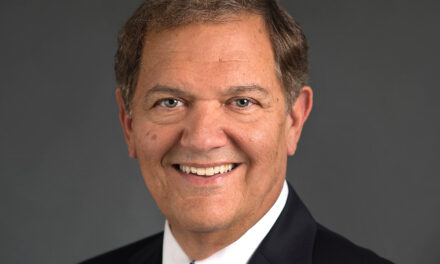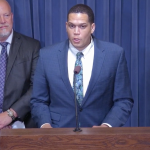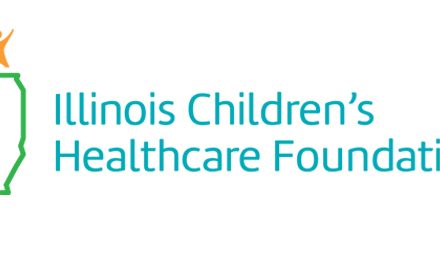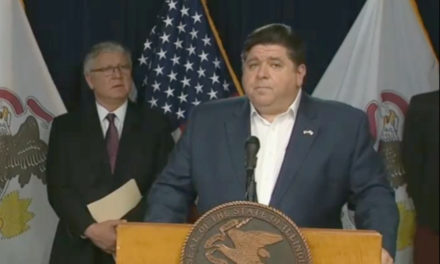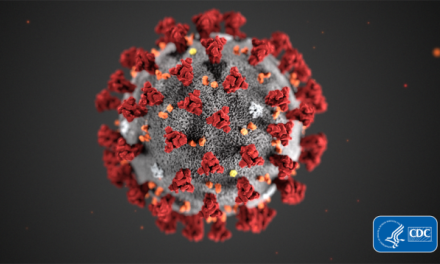
MCO leaders weigh in on redeterminations, provider payments and technology
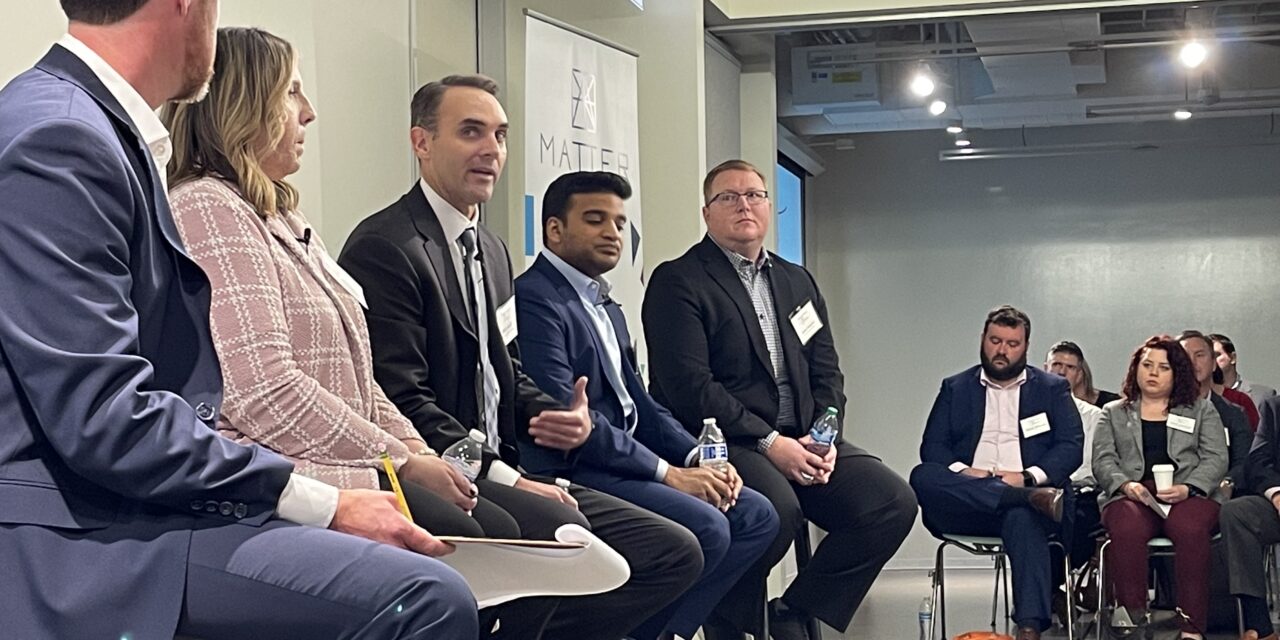
Health News Illinois convened a panel this week of heads of the state’s Medicaid health plans to discuss the most significant issues facing their industry.
Panelists included:
- Rushil Desai, CEO, Aetna Better Health of Illinois
- Aaron Galeener, Chief Administrative Officer, Health Plan Services for Cook County Health
- Nancy Wohlhart, Vice President of Medicaid for Blue Cross Blue Shield of Illinois
- Matt Wolf, Plan President, Molina Healthcare of Illinois
Edited excerpts below.
HNI: What are the top issues facing Medicare health plans right now?
Nancy Wohlhart: I think there’s a myriad of issues today, but the number one I think that we’re all concerned over is redeterminations. That’s going to be coming up really soon here, and not only does it impact our plans, but it also impacts members, it impacts providers. It’s so widespread—it’s just an industry as a whole. We also are concerned about behavioral health access. We all know that that has been a very hot topic, and we continue to look for ways to make sure that our members and all Medicaid members have access to behavioral health services. And then I think just really addressing the social determinants of health and the health inequities and disparities that are happening in today’s areas, especially the ones hit hardest by COVID. And COVID has not gone. We’re still dealing with a lot of COVID and making sure that everybody is getting vaccinated.
HNI: What is your plan doing to prepare for the return of redeterminations?
Aaron Galeener: For us, it’s really about trying to find every single touch point that a member has with us and with our plan, be that care managers with their providers or call center, to ensure that the information is there and available to them, that they know that they’re going to be going through the redetermination process, that they’ve got the right resources that can assist them through that. And then just continuing to find different ways to outreach and ensure that from a media perspective, social media that the message is out there. And right now we’re really focused, since we don’t know the exact date of when the public health emergency may end, on really working with members to have their demographic information updated and ensure that when the time comes, those forms are going to go to the right place, that there’s not going to be an administrative barrier for them being able to continue to have coverage.
Matt Wolf: If we’re not able to get their updated contact information and get their information so that they can fill out the redetermination paperwork, it means they will lose their Medicaid coverage. So that creates barriers to care, barriers to individuals being able to pay the portion of their care that is being provided to them. So it’s a huge impact. I mean, we’re talking tens of thousands, hundreds of thousands even, members that could potentially lose their Medicaid eligibility if they’re not able to get their redetermination, paperwork completed timely. Thankfully, with the support from the Department of Healthcare and Family Services, we’re now able to provide updated contact information to the state. Previously, it was ruled that the MCOs couldn’t do that, and individuals had to call the state department themselves. Now if we get updated information from the members, we’re able to provide that to the department on their behalf, so that they can get that appropriate information and get their applications mailed to them at the right location.
HNI: Where are things with provider payments? Are we in a better place now than we were before?
Rushil Desai: I think collectively, I would say yes, it’s in a better place. We’ve done a lot of work. Everyone on this panel and our teams have done a lot of work. The state, the associations really worked through all these claims issues. And a lot of it is changing the way we talk about that and work through it, because it’s data, giving them data to work through the claims and having that transparency where they can go ahead and see what’s driving a denial. Are they billing things correctly? Healthcare is complex. We’ll be the first to go ahead and say it’s never going to be perfect. There are always configuration issues. There are always going to be fee schedule changes. And in the state of Illinois, there are a lot of retroactive things that happen after the fact. And we’re always working to get that done as quickly as possible, and working with our providers and thinking about how to streamline this.
Where I go back to is where value-based contracting plays a really big role. And we’ve got to think about how we get out of fee-for-service and figure out what else we can do with some of these (alternative payment models). And for us, it’s been working with those providers to build that trust, to talk about data and to work through the claims components, but also figure out how we do more of a quality perspective, how we do more from a health equity perspective, and we focus on the right things and the right goals, which fundamentally all of our providers and our payers are focusing on from an inpatient reduction, (emergency department) reduction as well as the quality of care component.
Matt Wolf: I’ve been in Illinois managed care since 2014. In some of those early years, there were a lot of problems. It was new. You’re having some large Medicaid organizations, large predominantly Medicaid hospitals, billing management for the first time, and that was a difference. There were some unique challenges in that from how they typically bill fee-for-service. So seeing where we are now from where we were in some of those early rollout years with the reduced number of managed care organizations in the states, it’s a night-and-day difference. The Monday meetings, or as I like to refer to them as the accountability meetings, have been going on for years now, where provider-based organizations and every MCO come to the table and meet to talk about the different claims issues that the providers are having. And they say exactly which MCO they’re having those issues with, so there’s an extra level of accountability on the managed care organizations, as well as providers, to bring that information so we could look into those issues and resolve them. Over 90 percent of those issues have been resolved. Those meetings used to take place every two weeks. They’re now monthly. So I think you can see that, I think, we’ve all done talking. We don’t want to talk about claims issues. We want to talk about the member. We want to talk about how do we improve the quality of care for Medicaid—the most vulnerable population in this state—going forward. And I think we’re in a good position now to be able to have those conversations.
HNI: What is the role of Medicaid health plans in addressing social determinants of health?
Nancy Wohlhart: We play a very significant role. Social determinants of health are very important to this Medicaid population. A majority of the members have at least one social determinant of health that they’re facing. Many have multiple. Our roles are really to help remove those barriers. So those are barriers to care. We want the members to be able to get the care that they need to be able to live healthy lives. Whether it’s partnering with community outreach programs, whether it’s partnering with our transformation collaborations, there’s so many entities that are able to assist the members. And our role is to be able to coordinate all of that, get the members to the right resources so that we can ensure that they are receiving quality healthcare and removing those barriers that they’re facing.
HNI: What more can be done on this issue that’s not being done right now? What are some of the challenges?
Nancy Wohlhart: There’s a number of things. I think one of the top ones is housing. Housing is a huge barrier. No one’s going to worry about going to the doctor when they can’t figure out where they’re going to sleep that night. And so as managed care plans, I think we’re trying to put our heads together to work with community agencies, to partner with other entities to figure out how do we address the housing issue. It’s not an easy one. If we could all just build housing, I think it would have already been done. So I think housing is something that I know that we’re all trying to collaborate together on and figure out how do we address that. I also think access to fresh food … If you look around in some of the areas hardest hit by COVID, they don’t have grocery stores any longer. So how do we address that? We can do home-delivered meals, but is that really addressing that for that person long term? No. We have to be able to get them access to close grocery stores and things like that. And what role can we play in that, we haven’t quite figured out, but boy are we looking at that. We’re really trying to figure out how do we help those members in those areas.
Rushil Desai: I think it’s the end to end. I think we’ve got to get our information out to our providers. And we’re starting to see some of that. The state’s got these healthcare transformation collaboratives that are kicking in to really address that from a health equity perspective. And different zip codes and memberships that they’re focusing on have different needs, which is exactly what we’re touching on. I go back to the start of the journey from the enrollment process. It would be great to understand those needs early on. And again, I think we as an industry, as we kind of are tackling some of these core needs, we know we’ve gotten better from vaccination rates. So how do we come together as an industry, leverage these healthcare transformation collaboratives that the state is funding, our respective provider partnerships and our assets, and bring that all together to really help close those gaps? And again, I think housing, food insecurity, we’ve got to find a way to meet the members where they are and work with our providers to get them at the address of the situation equities.
Aaron Galeener: I think time is one, and connections and building out that network. The other thing that’s happening is, it’s not necessarily directly in MCOs, but as a result of pandemic, there’s been a surge of funding. And there’s a lot of these different interventions that are happening. And so I think it’s going to be a really exciting time to see the impact of some of these interventions, and then understand from those what’s a sustainable model for these investments going forward, because I think the financial component of that is … there’s going to be the surge, like there has been in the past during crises in public health funding. And then you’ll see a tapering off of that over time. But we really have to find a way to have a model that’s sustainable and that we can continue to drive these really critical interventions.
HNI: What are some of the unique challenges that some of your rural members face?
Matt Wolf: So in a lot of the rural communities, they don’t have the same availability of services that people in urban communities do. So they may have to drive 50 miles to go to their nearest hospital. They may have to drive 70 miles to go see their specialist. So one of the things that we’re looking at is how can we be able to get more services out into those communities. Mobile clinics, mobile units, being able to set those up. Sending nurse practitioners into the members’ homes to be able to do wellness exams, and do some checkups there. Case managers are out in the field going to the members. How can we do more to get out into the community and provide some of those services that may be lacking?
HNI: Where do you see technology as having the greatest potential to improve health outcomes?
Nancy Wohlhart: So we’ve rolled out a lot of technology around the member and member portals. So they can go in and be able to check all of their information. We’ve been texting members and doing stuff like that, in terms of technology and having that available for the members who can do that. And we always know in Medicaid that not all members have access to technology. So we have to also be able to reach those members as well. We’ve done such things as offering free phone plans and free phones out to members to be able to get them texted information about their healthcare, about making sure they’re picking up their prescriptions and doing stuff like that. From a technology standpoint, we also want to partner with providers. You really want to be able to access a lot of the data that they have through their (electronic medical records) systems, reason being is that they don’t have to continually send that data to us and we have it more real time. You’ll hear a lot of back-and-forth about having to fax in information or having to call in information. We can kind of look to bridge that and not have to do that as much if we have the automatic access. So technology is really going to be important in the future for all of us, for our members, for our providers and for us.
HNI: How important is data in improving outcomes?
Rushil Desai: It’s foundational. From a data perspective, we want to get to healthcare outcomes … So I think more and more as we push and we accelerate, whether it’s through value-based, whether it’s through data sharing, whether it’s through the various technological investments that we’ve all made here, from a member experience perspective, we’ve got to simplify and we’ve got to figure out, ‘Well, are we actually improving care? Are we actually closing the health equity gaps that we’re finding?’ And part of this is identifying what those gaps look like, and figuring out how we go ahead and solve for that. But the provider perspective and our perspective have really been data sharing. We’ve had some trust built on that …. How do we look at that provider level and let them know what we’re seeing on our end? How do they help us, once we had that EMR integration where we get data, how do we take it a step further to simplify it and make it digestible for our providers? Giving claims with every data field on there that’s got a thousand columns doesn’t really add a lot of value. But having one member list that has their information and has all the steps and our high-risk members’ care coordination, that adds value.

